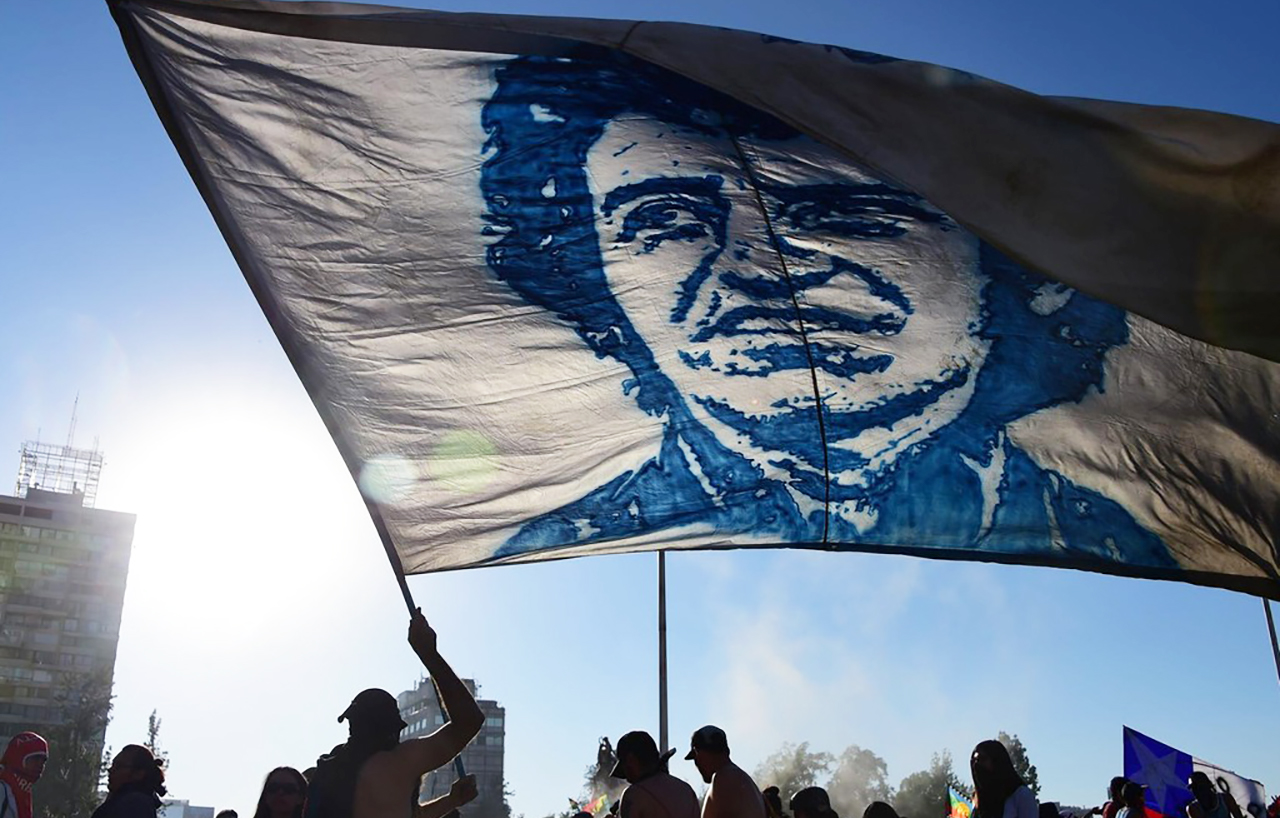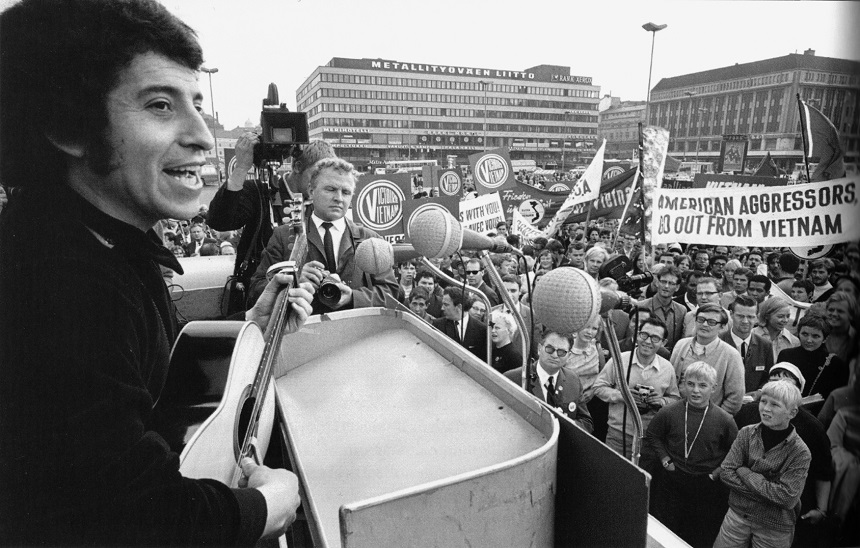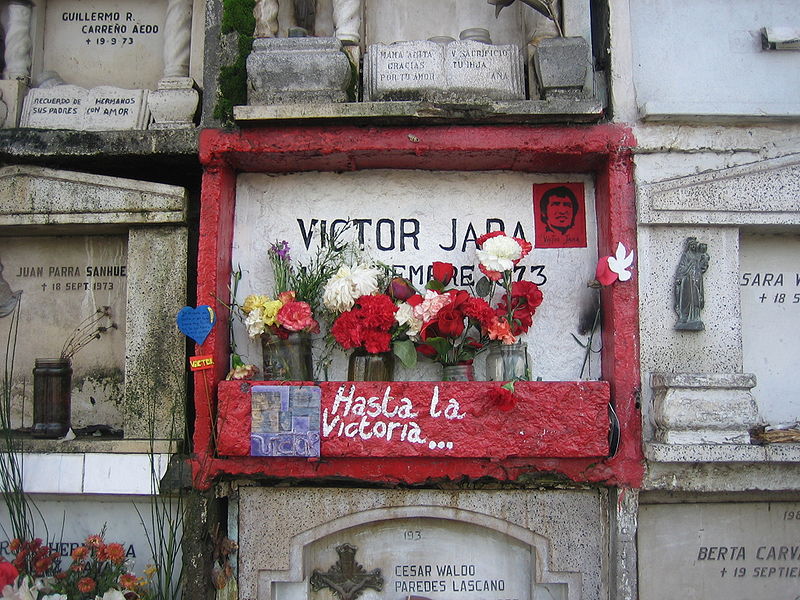The political history of twentieth century Latin America saw the rise of so many dictatorships, and the multifaceted peoples’ struggles against them have been integral parts of the socio-political-cultural lives of Latin American countries. Today, with the rising threat of Hindutva fascist forces taking over our country, how do we look at this history? What can we learn from the histories of cultural rebellion in Latin America? Especially when hundreds of activists from political movements, artists, and journalists are being imprisoned under false charges in our country? When the Indian state is eager to let poets like Varvara Rao, academics like GN Saibaba die in jail without bail, what meaning can cultural rebellion possess? Victor Jara was one of the poets of the long tradition of Latin American cultural rebellion. Today, on his 48th death anniversary, we remember the Chilean poet-singer who refused to bow down before the fascists.
Víctor Lidio Jara Martínez (28 September 1932 – 16 September 1973) was a Chilean teacher, poet, singer, song writer, theater director and political activist. Victor Jara came from a poor and underprivileged family which lived outside Santiago. His mother was of Mapuche Indian, and Victor inherited her gift for playing the guitar and singing folk songs. His mother struggled hard to ensure that her children received an education, and Victor grew up to be one of Chile’s most prominent folk singers. He also became a theatre director and acquired an university job.
Victor Jara rose to prominence in the late 1960s as part of the Nueva Canción (New Song) movement, which sought to infuse Chilean folk music with the existing everyday social realities. His songs and public concerts, drawing thousands of working people, students and youths, played an important role in paving the way for the election of Salvador Allende in 1970.
Throughout the three tumultuous years of Allende’s government, Jara remained committed to Allende and his socialist ideas. The two men died within days of each other, following the American assisted Chilean coup of 11 September 1973, which overthrew Salvador Allende. Victor Jara too was arrested, tortured during interrogations and ultimately shot dead on 16 September, and his body was thrown out on the streets, near a shantytown in Santiago, by the military officials of Augusto Pinochet — the dictator who succeeded Allende after the coup.
There are many conflicting accounts of Jara’s last days. But they differ only in how he was tortured. According to one narrative, being a famous musician and prominent supporter of Allende, Jara was swiftly recognised while being taken into a boxing stadium in Santiago along with others. He was first separated from the other detainees, then beaten up and tortured in the bowels of the stadium. An army officer threw a lit cigarette on the ground, made Jara crawl for it, then stamped on his wrists. At one point, he defiantly sang Venceremos (We Will Win), Allende’s 1970 election anthem, through split lips. On the morning of 16 September, according to a fellow detainee, before being dragged away, Jara asked for a pen and notebook and scribbled the lyrics to Estadio Chile. He also managed to pass along the song to a friend, who hid it in his shoe, which was later smuggled out of the stadium. This would be his last song : “How hard it is to sing when I must sing of horror/ Horror which I am living, horror of which I am dying.”
Two hours later, he was shot dead, his body was riddled with machine-gun bullets and dumped in the street. He was 40 years old at the time of his death. On 18 September, his wife Joan Jara, went to the hospital morgue, identified and took his lifeless body, riddled with machine-gun bullets, to Santiago’s general cemetery and arranged a hasty, clandestine burial before fleeing into exile.
Joan Jara, in her 1983 memoir described her husband Víctor Jara as a gentle family man as well as a charismatic revolutionary. For Chileans, Víctor Jara remains an icon and his death an unforgettable episode in a national trauma. The manner of his death, the silencing of his music, and his courage made him an international symbol of resistance against oppressive regimes.
In 2003, 13 years after Pinochet left office, Estadio Chile was renamed Estadio Víctor Jara. In 2009, following an international campaign and appeals by his wife, new investigations were ordered into his murder. Victor’s body was reburied in a public funeral attended by thousands of mourners. In 2016, in a trial, former Chilean army officer Pedro Barrientos was found liable for Jara’s death. In 2018, eight more retired officers were convicted and jailed for their involvement in his murder by a Chilean court. After this verdict, 91-year-old Joan Jara said “I am one of the lucky ones. So many people here in Chile, so many families, they still don’t know the destiny of their loved ones. That is the worst fate.”
Victor Jara once said, “We are who we are because of love. And we want to be better because love exists. The world turns, creates, multiplies because of love.” His songs were also for an overwhelming kind of love. Another name for that kind of love is freedom. Yet another name for that love is music. He was killed for that music, because to the fascists, his songs reveberating in rebellious voices in the streets, at homes, in factories, in shanty towns and inside universities, had always sounded to be more powerful than the roar of hundred machine guns. Pinochet’s men pumped 44 bullets in his body. There were bullet marks on his head, chest, abdomen, hands and feet. His crime was a simple one : he had put into tune and words what he saw, what he felt. So the two hands that played the guitar were crushed, and the voice that championed the rights of the people to live in peace and justice (‘El derecho de vivir en paz’) was silenced forever.
Today, while remembering Victor Jara, it would be wrong to focus only on his brutal murder. Instead, what we need to do is to speak of his songs and music, his ideals of love, peace and justice, his unquavering faith in socialism against capitalist exploitation and oppression. While we discuss and debate the fallout of the recent American military withdrawal from Afghanistan, after two decades of its ‘war on terror’, following the 9/11 attacks in New York in 2001, let’s also not forget, that there was another 9/11 – in Chile in 1973 – which toppled a democratically elected socialist government through a bloody coup, planned and executed through its active assistance.




